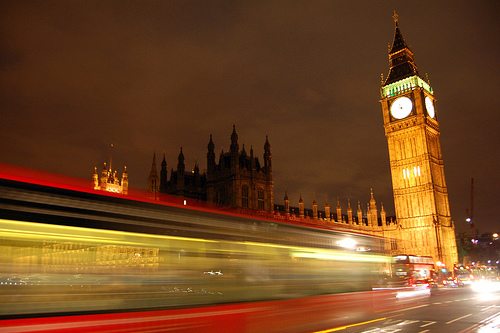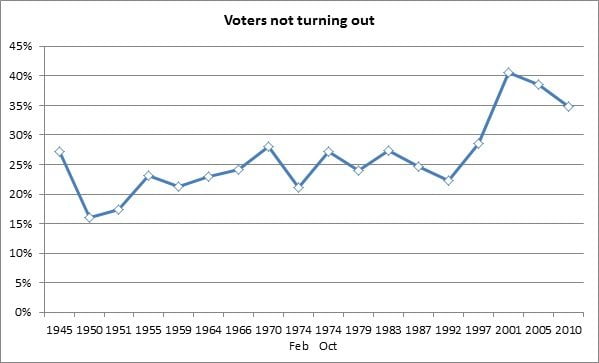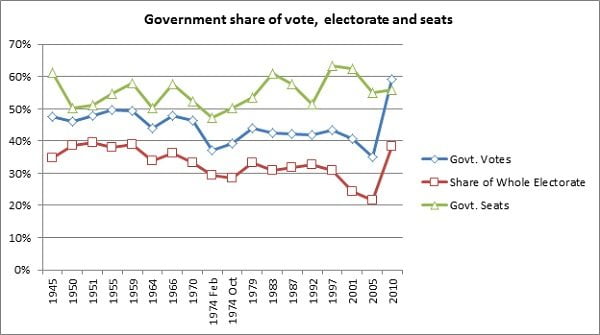

Economy
Sustainability could hold the key to 2015 general election result
With 632 days until the next general election, parties are hiring US and Australian election strategists while looking at the message they will take to a sceptical and all too often disinterested electorate. Simon Leadbetter makes the case for a party that backs a sustainable recovery, starting with our current unsustainable democracy.
Following the Fixed Terms Parliament Act 2011, short of the current coalition collapsing, we know when the next general election will be held: May 7 2015.
With the Scottish independence referendum vote taking place less than eight months before, this could be the last UK-wide general election. It is actually quite strange to think that the 56th parliament of the United Kingdom could be its last, ending a parliamentary system that commenced in 1801, with the creation of the first parliament.
Ireland, part of that first parliament, left the UK in 1922. Bizarrely, the UK only got round to changing parliament’s name in 1929, recognising it now only included Northern Ireland. Scotland and Wales secured a modicum of self-government in 1997, with the first sittings in 1999. The Northern Ireland Assembly was established in 2000, but has endured four suspensions, with the longest being between 2002 and 2007.
The UK looks more disunited than ever. If Scotland goes, pressure in Wales for far greater autonomy or full-blown independence will grow. It is not outside the realms of possibility that the English electorate might decide it’s better off alone and demand uncoupling the remaining parts of the UK. The West Lothian question would become the Cardiff West and Belfast West question.
First posed by Gladstone in 1886 over Irish home rule, the West Lothian question was coined by Tam Dalyell in 1977 in a debate over Scottish and Welsh devolution.
He asked, “For how long will English constituencies and English honourable members tolerate […] at least 119 honourable members from Scotland, Wales and Northern Ireland exercising an important, and probably often decisive, effect on English politics while they themselves have no say in the same matters in Scotland, Wales and Northern Ireland?”
Attempts to reform the House of Lords and reduce the number of MPs failed with coalition recriminations flying. This is a bad thing for the Lords and good thing for the Commons in our opinion. A democracy requires its decision-makers to be elected rather than appointed, no matter how worthy or experienced the members of the upper house. A rest home for failed and retired politicians, party donors and the unelected is not a good advertisement for democracy to the rest of the world, especially for the mother of all parliaments.
Reducing the number of MPs in a system that puts many MPs on the government payroll would further reduce the lower house’s independence. It’s far better to reduce the number of ministers and other payroll members; how we managed to fight two world wars with less than half the number of ministers, we will never know.
 The Disunited Kingdom is true of the political parties, too, where the Conservatives increasingly represent the south and Labour the north. As this excellent piece from the Guardian’s Andrew Rawnsley indicates, the retreat of the two major parties into their respective geographical strongholds makes a hung parliament more likely.
The Disunited Kingdom is true of the political parties, too, where the Conservatives increasingly represent the south and Labour the north. As this excellent piece from the Guardian’s Andrew Rawnsley indicates, the retreat of the two major parties into their respective geographical strongholds makes a hung parliament more likely.
Rawnsley points out, “Of the 158 seats in the three northern English regions, only 43 have a Conservative MP. The Tories hold just two seats in the north-east and have only one MP in the whole of Scotland […] Under a line drawn from the Wash to the Bristol Channel, there are 197 seats outside London. Just 10 of those seats are represented by a Labour MP.”
He also makes a startling statement, saying, “Down-at-heel parts of the south are much more likely to vote Tory than their equivalents in the north. Geography has superseded class. Affluent northerners (the As and Bs of pollsters’ jargon) are more likely to vote Labour than poorer southerners (the Ds and the Es). We are not so much a country divided as two nations.”
The rise of UKIP has done to the Conservatives what the creation of the SDP did to Labour in the 1980s. By splitting the supporters of right (UKIP) and left (SDP) into factions that are either more (UKIP) or less (SDP) extreme, the result of any election is harder to call. A surge for UKIP during the European election next year will unsettle the horses. If Scotland does votes for independence or the vote is close, expect a flurry of calls for an English/Wales/Northern Ireland-only election and parliament.
By far the fastest growing party has been the ‘none of the above’ party. Support for no one peaked at 40% in 2001 but remains disturbingly high at 35% in 2010. As Matt Chocqueel-Mangan of Vote for Policies told Blue & Green Tomorrow recently, “If something doesn’t work, it’s because there is a usability problem – not a user problem.” Voter apathy is the fault of broken party politics and electoral system, not the voters themselves.
 What has discredited parliament most, other than expenses scandals, corporate lobbying and cash for honours or access, has been the way governments have governed as though they have an overwhelming mandate from the people. This has not been the case. Ever. Our crazy first past the post system means parties that secured less than half the vote can secure a thumping majority in seats – and then thump the people with policies a tiny minority support.
What has discredited parliament most, other than expenses scandals, corporate lobbying and cash for honours or access, has been the way governments have governed as though they have an overwhelming mandate from the people. This has not been the case. Ever. Our crazy first past the post system means parties that secured less than half the vote can secure a thumping majority in seats – and then thump the people with policies a tiny minority support.
Margaret Thatcher’s 61% of the seats landslide in 1983 had actually persuaded just 42% of the voters and 31% of the electorate. Tony Blair turned the tables dramatically in 1997, winning 63% of the seats with just 43% of the vote and 31% of the electorate. Even though the current coalition can claim that the two parties secured 60% of the votes between them, they still secured less than 40% of the electorate. Blair must have been laughing all the way to Number 10 when he secured 55% of the seats with just 22% of the electorate backing him.
 Our ‘representative’ democracy does not represent the will of the people.
Our ‘representative’ democracy does not represent the will of the people.
Do not ask whether it is representative of the profile of the British people. White, male, middle class, privately and Oxbridge-educated, parliament looks nothing like the people it is supposed to represent. With no sense of irony, parliament itself states, “The House of Commons is more reflective of the population it represents than ever before. However, it remains the case that more than 400 MPs, 62% of the total, are white men aged over 40.”
Our ‘representative’ democracy does not represent the profile of the people.
As for the major parties, it’s not as if they have any widespread party membership, meaning they are increasingly captured by the more committed fringes of the party spectrum. As this briefing paper from 2012 pointed out, “In 2010, only 1.0% of the electorate was a member of one of the three main political parties. Labour had approximately 193,000 members, the Conservatives 130,000 to 150,000 and the Liberal Democrats 49,000. However in the early 1950s, the Conservatives claimed nearly 3 million members while Labour claimed more than 1 million members.”
Our ‘major parties’ are neither major nor really that much of a party. No one seems to want to go.
How do we create a sustainable democracy?
Here are four modest little proposals that could restore our democracy and be potentially decisive for a party that supported them.
1. Support for a sustainable recovery, green collar work, renewable energy (consistently supported by 78-80% in poll after poll after poll after poll) and cleantech (growing at 18% year-on-year) to make the United Kingdom (or whatever is left of it) the global leader across the sector, as we already are in offshore wind
2. Support for rail transport, including renationalising rail (73-90% of the population want this) and constructing more light rail to connect more towns to the national rail network. A 2009 report by the Association of Train Operating Companies (ATOC) identified 20 places that would benefit from a rail link, at a cost of just £500m. We also need more a lot freight capacity to alleviate pressure on our roads, probably more than a high speed link
3. An elected House of Lords and a representative Commons, with the share of votes won reflected in the number of seats held
4. Introduce state funding of parties – with money distributed by share of votes. After all, you get the democracy you pay for – as Conservative, Labour and Lib Dem donors know only too well. A parliament paid for by the people would be better than one paid for by unions, corporations and interesting wealthy individuals. £2.50 a year doesn’t seem too big a price to clean up parliament
Supporters of entrepreneurship, innovation and disruption should like the green economy aspect; the supporters of state-run natural monopolies should like the renationalisation of rail; and genuine democrats (surely all politicians) should like the elected Lords and representative commons. Adopting such policies would allow the parties to make inroads into each other’s geographical and ideological strongholds.
Politics today is less about the old divisions of left and right, but the added complexities of authoritarian or libertarian and sustainable or unsustainable. We care most about the latter.
Further reading:
We need Conservative, Labour, Liberal Democrats and nationalist parties that get sustainability
Green policies beat Brown’s (reds, blues and yellows)
If we voted for policies at elections, and not parties, the results might surprise us all
Party funding and MPs’ pay: you get the democracy you pay for


 Environment12 months ago
Environment12 months agoAre Polymer Banknotes: an Eco-Friendly Trend or a Groundswell?

 Features11 months ago
Features11 months agoEco-Friendly Cryptocurrencies: Sustainable Investment Choices

 Features12 months ago
Features12 months agoEco-Friendly Crypto Traders Must Find the Right Exchange

 Energy11 months ago
Energy11 months agoThe Growing Role of Solar Panels in Ireland’s Energy Future




























